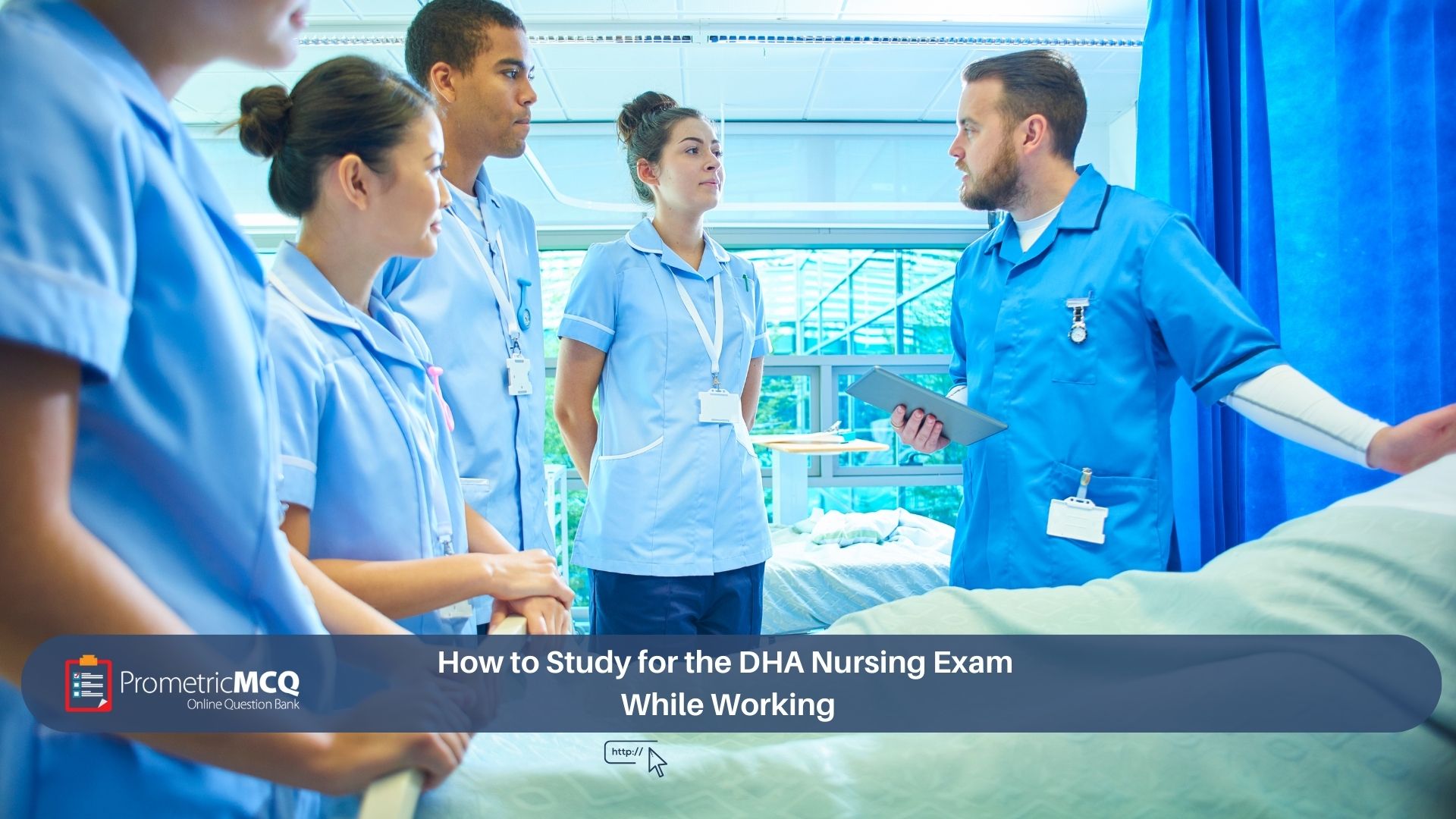
How to Study for the DHA Nursing Exam While Working
fatima@prometricmcq.com2025-09-29T23:24:09+00:00Table of Contents
ToggleHow to Study for the DHA Nursing Exam While Working (2025 Guide)
For a dedicated, working nurse, the dream of practicing in Dubai’s world-class healthcare system is a powerful motivator. The Dubai Health Authority (DHA) license represents a gateway to professional advancement, but it requires passing a challenging Prometric exam. Juggling demanding shifts, family commitments, and personal time while preparing for such a high-stakes test can feel like an insurmountable task. The question isn’t just “what to study,” but “how is it even possible to study effectively while working full-time?”
The answer lies not in finding more hours in the day, but in maximizing the efficiency of the hours you already have. Success for a working nurse is not about marathon study sessions; it’s about strategy, consistency, and smart, targeted learning. It requires a fundamental shift from a traditional, passive study model to an active, high-intensity approach that fits into the fragmented schedule of a healthcare professional. You must transform your mindset from “I don’t have time to study” to “I will make the most of the time I have.”
This ultimate 2025 guide is designed specifically for you—the busy, working nurse. We will provide a practical, step-by-step blueprint for balancing your job with effective DHA exam preparation. We’ll explore high-efficiency study techniques, realistic scheduling strategies, and methods to protect your well-being and prevent burnout. This is complemented by a comprehensive 10-point FAQ section to address the unique challenges you face. This guide will show you that passing the DHA exam while working is not just possible—it’s an achievable goal with the right plan.
Key Takeaways for the Working Nurse
- Embrace “Study Snacking”: Leverage short, 15-20 minute bursts of high-intensity study during breaks, commutes, and downtime.
- Prioritize Active Recall (MCQs): Your most valuable study time should be spent solving questions in a QBank, not passively reading textbooks.
- Make Your Phone Your University: Use mobile-friendly study tools and apps to turn any free moment, anywhere, into a productive study session.
- Sleep is a Non-Negotiable Study Tool: Sacrificing sleep for study is counterproductive. Quality rest is essential for memory consolidation and cognitive function.
- Consistency Over Intensity: One focused hour of study every day is far more effective than trying to cram for eight hours once a week.
The Mindset Shift: From “Finding Time” to “Making Time”
The first and most crucial step is to reframe your approach. The idea that you will simply “find” large blocks of free time is unrealistic. As a nurse, your schedule is demanding and often unpredictable. The successful candidate *makes* time by strategically integrating study into the fabric of their existing day. This involves a conscious decision to make DHA exam preparation a top priority for a defined period. It’s a temporary, high-intensity sprint, not a permanent lifestyle change. A great first step is to get familiar with the DHA exam and license application process to set a clear goal.
Step 1: Crafting a Realistic, High-Efficiency Study Schedule
A generic study plan won’t work for you. Your plan must be tailored to the realities of shift work and fluctuating energy levels.
Phase 1: The Time Audit (1 Week)
Before you can manage your time, you must know where it goes. For one week, be brutally honest with yourself. Use a notebook or an app to track how you spend your time outside of work. Note down commute times, lunch breaks, time spent on social media, watching TV, etc. At the end of the week, you will have a clear picture of your “time leaks” and identify hidden pockets of opportunity. You’ll be surprised to find 15 minutes here, 30 minutes there—this is your new study time.
Phase 2: The “Power Hour” and “Study Snacking” Method
Forget the idea of 3-4 hour study blocks on workdays. It’s a recipe for burnout. Instead, build your schedule around two concepts:
- The Daily Power Hour: Commit to one, single hour of high-focus, uninterrupted study each workday. This is your non-negotiable time. It could be an hour before your family wakes up or an hour after you’ve decompressed from a shift.
- “Study Snacking”: This is where you use the pockets of time you identified in your audit. The goal is to accumulate an additional 45-60 minutes of study through short bursts:
- 15 minutes during your commute (if you use public transport).
- 20 minutes during your lunch break.
- 10 minutes while waiting in line or for a meeting to start.
Phase 3: The “Weekend Warrior” Deep Dive
Your days off are your most valuable asset. This is where you will do the heavy lifting. Designate one of your off-days as a “Deep Dive Day.”
- Morning Session (3-4 hours): Focus on a full-length, timed mock exam or a large block of MCQs from your weak areas.
- Afternoon Session (2-3 hours): Meticulously review the rationales for every question from your morning session. This is where the real learning occurs.
- Your Other Day Off: Protect this day for rest, errands, family, and recharging. A full-on study schedule with no breaks is the fastest path to burnout.
Step 2: High-Efficiency Study Techniques for the Time-Crunched Nurse
With limited time, your study methods must be ruthlessly efficient. This means prioritizing active learning techniques that yield the highest return on your time investment.
Adopt an “MCQ-First” Approach
Passively reading a textbook is the least efficient way to study for a clinical reasoning exam. Instead, make a high-quality question bank your primary study tool. Start a new topic by jumping straight into solving MCQs. You might get a lot wrong initially, but the process of attempting the question and then deeply studying the detailed rationale is a far more effective way to learn and retain information than simply reading about it. This approach is the core of any successful DHA exam preparation strategy.
Leverage Technology: Your University in Your Pocket
Your smartphone is your most powerful study weapon. Ensure your chosen QBank is mobile-friendly. This allows you to turn every moment of downtime into a “study snack.”
- At Work: During a quiet moment or your coffee break, solve 5-10 MCQs. This keeps your brain engaged with the material throughout the day.
- During Commute: If you take a bus or train, this is a prime opportunity to complete a block of 25-50 questions.
- Use Flashcard Apps: Use apps like Anki or Quizlet to create digital flashcards for high-yield facts, lab values, and drug information that you can review in seconds.
Step 3: Protecting Your Well-being to Prevent Burnout
As a nurse, you know the importance of health. The same principles apply to your study marathon. Pushing yourself to the point of exhaustion is a losing strategy.
Sleep is a Core Study Tool
It is during sleep, particularly deep REM sleep, that your brain consolidates new information and moves it from short-term to long-term memory. Sacrificing sleep to cram is one of the worst things you can do. It impairs your cognitive function, reduces your recall ability, and increases stress. Protect your 7-8 hours of sleep as fiercely as you protect your designated study time.
Schedule “No-Study” Time
Just as you schedule your study sessions, you must schedule your downtime. Block out time for exercise, hobbies, and quality time with family and friends. This is not a luxury; it’s a necessity to prevent mental fatigue and maintain motivation over the long term. For more on preventing burnout in the nursing profession, resources from organizations like the American Nurses Association (ANA) can be incredibly valuable.
Frequently Asked Questions (FAQs) for Working Nurses
Focus on quality over quantity. Aim for a total of 1.5 to 2 hours of high-quality, focused study on your workdays (e.g., one “Power Hour” plus 30-60 minutes of “Study Snacking”). On your days off, aim for a more substantial 4-6 hour “Deep Dive” session.
This depends on your personal chronotype. “Morning larks” may find that waking up an hour earlier to do their “Power Hour” before a shift is most effective. “Night owls” may prefer to decompress for an hour after work and then study. Experiment for a week and see what works best for your energy levels.
Use one day off for a long, intensive session that includes a timed mock exam to simulate the real test. Use your other day off to completely rest and recharge. This balance prevents burnout and makes your study time more effective.
On exceptionally draining days, don’t force a full “Power Hour.” Instead, focus on low-intensity “Study Snacking.” Even just reviewing 10 flashcards or doing 5 MCQs on your phone is better than doing nothing. This maintains consistency and momentum without causing burnout.
For a time-crunched professional, a high-quality QBank should be your primary tool. Use a textbook or a review manual as a reference to look up topics you consistently get wrong in the QBank, rather than reading it cover-to-cover.
Keep your “why” front and center. Write down your reasons for wanting to work in Dubai and place it where you can see it daily. Track your progress—seeing your QBank scores improve over time is a powerful motivator. Finally, reward yourself for sticking to your schedule.
Don’t panic and don’t try to “catch up” by cramming. The schedule is a guide, not a rigid set of rules. Acknowledge that you had a tough week, take a day to reset, and then simply pick up where you left off. The goal is long-term consistency, not short-term perfection.
Be open and honest. Explain that this is a temporary but very important goal for you. Ask for their support and understanding. Involve them in your schedule by planning your “no-study” time with them. This makes them part of your support team rather than a source of distraction.
Absolutely. Thousands of working nurses successfully pass the DHA exam every year. The common denominator is not raw intelligence or having more free time; it is a smart, strategic, and consistent study plan.
Prioritize the highest-yield topics. For the DHA nursing exam, these are: Prioritization of Care (ABCs, Maslow’s), Patient Safety (medication rights, infection control, fall prevention), and core Medical-Surgical Nursing concepts. Mastering these areas will give you the greatest return on your study time.
Conclusion: A Strategy for the Achievable Dream
Studying for the DHA nursing exam while managing a demanding job is one of the most challenging things you will do in your career. It requires sacrifice, discipline, and an unwavering focus on your goal. But it is far from impossible. By trading unrealistic expectations for a smart, efficient, and consistent strategy, you can turn small pockets of time into powerful learning opportunities. Focus on active, question-based learning, protect your well-being, and trust in your plan. The reward—a fulfilling nursing career in Dubai—is well worth the effort.
Ready to Make Every Minute Count?
Our comprehensive, mobile-friendly QBank is filled with high-yield MCQs, detailed rationales, and simulated exams, allowing you to turn any moment into a productive study session and guarantee your success.










